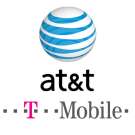AT&T withdrew its application for the merger with T-Mobile from the FCC yesterday to focus its efforts on getting approval from Department of Justice.
While officially they still seem to be optimistic, there's a chance could take a turn for the worse.
Reuters reports on the circumstances that lead to the this decision:
The move comes after FCC Chairman Julius Genachowski indicated on Tuesday that he did not approve of the deal, informing other commissioners that the matter should be sent to an administrative hearing. That is the first step towards blocking the proposal.The agency typically makes such referrals in cases where it cannot find a public benefit to a deal, or if it has a lot of questions about it
Since the Department of Justice's anti-trust case
against the merger is set up for February, the companies have said that
they are withdrawing in order to better focus on all of their options
and consolidate so that they can progress the merger.
But, there's one caveat:
However, AT&T has also said it will take a $4 billion charge to its balance sheet to reflect the potential fee it would owe Deutsche Telekom should the deal fall through.
This move prepares AT&T to
pay out $3 billion as a payment and $1 billion in book value of spectrum
to Deutsche Telekom (T-Mobile's parent company) in case the merger
doesn't happen. The Verge puts it very succinctly:
So, as far as AT&T's accountants are concerned, the failure of the $39 billion T-Mobile acquisition is now more likely than its success.
While AT&T could be playing
it safe, it seems that with all of the problems plaguing this merger,
they might be getting ready to give up. If the merger were to go
through, AT&T would become the largest major US carrier.
This is good news for customers as they would have been the biggest losers with the merger. As Om Malik of GigaOM network had pointed out at the time of the merger:
While AT&T and T-Mobile are going to try to spin it as a good deal to combine wireless spectrum assets, the fact is that T-Mobile USA is now out of the market.
T-Mobile USA has been fairly aggressive in offering cheaper voice and data plans as it has tried to compete with its larger brethren. The competition has kept the prices in the market low enough. This has worked well for U.S. consumers. With the merger of AT&T & T-Mobile, the market is now reduced to three national players – AT&T, Verizon and Sprint. Net-net U.S. consumers are going to lose.








0 Comment
Post a Comment